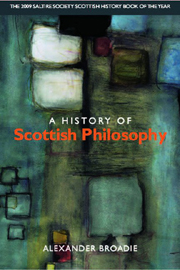Book contents
- Frontmatter
- Contents
- Acknowledgements
- 1 Introduction
- 2 John Duns Scotus
- 3 The Fifteenth Century
- 4 The Circle of John Mair
- 5 Humanism and After
- 6 Scotland Moves into the Age of Enlightenment
- 7 David Hume
- 8 Adam Smith
- 9 The Scottish School of Common Sense Philosophy
- 10 The Nineteenth Century: Ferrier to Seth
- 11 Realism and Idealism: Some Twentieth-century Narratives
- 12 Conclusion
- Bibliography
- Index
5 - Humanism and After
Published online by Cambridge University Press: 12 September 2012
- Frontmatter
- Contents
- Acknowledgements
- 1 Introduction
- 2 John Duns Scotus
- 3 The Fifteenth Century
- 4 The Circle of John Mair
- 5 Humanism and After
- 6 Scotland Moves into the Age of Enlightenment
- 7 David Hume
- 8 Adam Smith
- 9 The Scottish School of Common Sense Philosophy
- 10 The Nineteenth Century: Ferrier to Seth
- 11 Realism and Idealism: Some Twentieth-century Narratives
- 12 Conclusion
- Bibliography
- Index
Summary
Section 1: Renaissance humanism arrives in Scotland
In this chapter I shall consider the developments in philosophy in Scotland after the heyday of the circle of John Mair and pay particular attention to the contrasts between that earlier period and its aftermath. In considering the contrasts we should bear in mind that all members of Mair's circle had been logicians and that even those of their works that are neither logic textbooks nor commentaries on books of logic are suffused with the terms, logical categories and logical principles of distinction that are expounded in the logic textbooks. Deploying the extensive vocabulary of formal logic, they argued every point, analysing criticisms of their theses, and criticising the criticisms, and so on, until their defence of these theses was as strong as they could make it. Inevitably most of their works were long. However, that could not be a criticism in the eyes of those authors, for their purpose was to reach the truth however many pages it took. In this respect the members of Mair's circle inherited the scholastic way of philosophising. As well as having their own intrinsic interest, the main positions that were established were seen as contributing to an understanding and appreciation of the saving truths of Christianity. For a Christian, those truths were the most important thing, and if brevity had to be sacrificed in the interests of getting at the truth it was a small price to pay. The logic and philosophy developed by the medieval logicians were theologians' tools.
- Type
- Chapter
- Information
- A History of Scottish Philosophy , pp. 87 - 103Publisher: Edinburgh University PressPrint publication year: 2008



